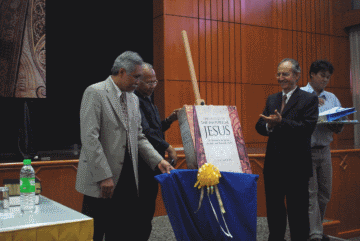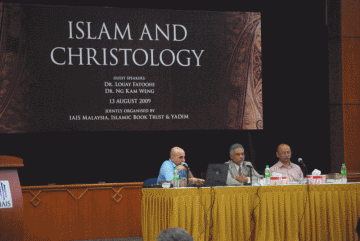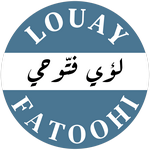
The book is launched by Yg. Bhg. Datuk Haji Mohd Nakhaie Hj Ahmad(Chairman of YADIM), Professor Muhammad Hashim Kamali (Chairman of IAIS), and Professor Osman Bakar (IAIS)

The Seminar was moderated by Professor Osman Bakar
1. Four Approaches
Almost any study of history in the Bible and the Qur’an follows one of four main and distinct approaches, which I have called “secular,” “Biblical,” “secular-Biblical,” and “Qur’anic.” In my book on the historical Jesus, I explained in detail these four approaches, but I will introduce them briefly here. Although each one of the four approaches employs fundamentally different assumptions and methods, it is not uncommon for researchers not to make clear what approach they adopt. It is also not uncommon for studies to show a mix of approaches and confused methodology, which is what the secular-Biblical approach is. Understanding these different approaches and clarifying what approach a researcher takes is critical to properly understand and evaluate their arguments.
1.1 The Secular Approach
The secular approach does not give the Bible or the Qur’an, or for that matter any other religious text, any special credibility because of its religious nature. Any scriptural text is treated like any other ancient sources whose accounts may or may not be accurate, and the credibility of any account is considered on its merits. On the face of it, the secular approach may very much sound like an objective approach and one that impartial scholars would take, as the other three approaches are faith-driven, even though the secular-Biblical approach is less so than the Biblical or Qur’anic approaches. But not to base a study on religious beliefs is no guarantee of genuine objectivity. While a secular researcher would not start off with a fundamental religious assumption, he may well use a variety of assumptionswhen dealing with various questions. The objectivity of any secular research is thus equally susceptible to the researcher’s non-religious biases and assumptions, and these can translate into flawed methodology and unbalanced arguments and conclusions. This is why, for instance, physicist and founder of the Quantum theory Max Planck once said that “a new scientific truth does not triumph by convincing its opponents and making them see the light, but rather because its opponents eventually die, and a new generation grows up that is familiar with it.” The history of science is replete with examples supporting Planck’s observation. Those who conduct research in science share with those who do research in humanities and other non-science disciplines one serious frailty: human nature!
1.2 The Biblical Approach
The faith-driven Biblical approach considers the Bible to be the literal Word of God or at least inspired by God. Consequently, the Bible’s account of history is considered to be completely factual. The researcher who adopts this approach seeks to understand any extra-Biblical historical fact in line with what the Bible says. This reconciliation process may require coming up with a particular reading or interpretation of the Biblical text or the fact.
Setting out from the assumption that the Bible is a divine book, Biblicists who follow this approach clearly disagree with secularists who claim that the Bible contains inaccurate and wrong information and internal inconsistencies. Such claims are dismissed or explained away one way or another. Biblicists share with secular researchers the view that the Qur’an is based on the Bible and other Jewish and Christian sources and is not an independent source. I have addressed the fundamental flaw in this assumption through the introduction of concept of “contextual displacement” in Jewish and Christian religious writings.
There are four major problems with the fundamental assumption of the Biblical approach. First, there are internal discrepancies in the Bible. Second, the book contains unfactual Statements. Third, the term “Bible” is actually indefinable, as different groups of believers disagree on what books form the “Bible” and which books are non-canonical or “apocryphal.” The Bible of the Jews and the Bible according to the Christians are not one and the same. For instance, the Jews do not believe that the New Testament belongs to the Bible or that it is divinely inspired in any way. Similarly, as many as seven books in the canon of the Catholic and Orthodox churches — Tobias, Judith, Baruch, Ecclesiasticus, Wisdom, First and Second Maccabees — as well as certain parts to the Books of Esther and Daniel are considered apocryphal by the Protestants. Fourth, the superiority given to the canonical books of the Bible over apocryphal writings is untenable given the political history of the compilation of the Biblical text.
1.3 The Secular-Biblical Approach
The secular-Biblical approach is a hybrid methodology which is the result of rejecting the inerrancy of the Bible but accepting the historical accuracy of parts of it — although researchers disagree on which Biblical statements are historical — while retaining some form of faith in the Bible as scripture. A typical researcher who follows this approach may concede that little or much of the historical information in the Bible is wrong, just like a secularist does, but they still subscribe to some Biblical theology. The reason that I have distinguished this approach from the secular one is that the retained faith in the Bible can influence how the text is dealt with by the researcher.
Unlike the Biblical approach, there is nothing intrinsically wrong with this approach. But, like any approach, it is open to abuse by the individual researcher’s prejudices and/or various forms of incompetence.
1.4 The Qur’anic Approach
Finally, the Qur’anic approach, which I use in my writings, is based on accepting the Qur’an’s claim to be the Word of God which Muhammad received and communicated without any change to people. It presumes the absolute verity of the Qur’an. It seeks to understand history and everything that the Qur’an addresses in line with what this book says.
There are many who argue against the assumption that the Qur’an is the Word of God and claim that it was copied from Jewish and Christian sources. There are a number of theories as to how the Qur’an could have borrowed from other sources, but there is no shred of material evidence that this happened. Additionally, the fundamental assumption that the Qur’an is the Word of God cannot be rejected on the basis of the history of the text in the same way that the equivalent assumption of the Biblical approach can. The history of the Bible and that of the Qur’an are very different. The Qur’an was revealed over 22 years (610-632 CE) and the revealed text did not go through any development or change. Also, none of the four fundamental problems that undermine the basic assumption of the Biblical approach applies to the Qur’an.
The ultimate test for the assumption that a book is the Word of God is that it must be free of inconsistencies, inaccuracies, or mistakes. If the book is found to contain any of these flaws, then it cannot be attributed in its entirety to the all-knowing, unerring God.
Verifying the accuracy of some Qur’anic statements by comparing it with established facts, say historical or scientific, is not an approach that can be applied to every statement in the Qur’an. In fact, it can be used with a relatively small number of verses only, because most of the Qur’an talks about unverifiable metaphysical and theological issues. For instance, the Day of Resurrection and the afterlife are major themes in the Qur’an, with numerous verses dedicated to them. Yet there is no way to verify these future events. Similarly, statements about God and spiritual beings, such as the angels, are also unverifiable. This is why the belief in the Qur’an, or the Bible for that matter, cannot be completely justified rationally and would always involve accepting claims that cannot be attested, i.e. an element of faith. The Qur’an stresses in many verses that faith involves belief in the ghayb, a term that may be translated as “the unseen” or “the unknown.” Words that share the same root with ghayb include ghaba (became absent; disappeared) and gha’ib (absent). One quality of the pious is that they “believe in the unseen” (2.3). Statements about the “unseen” cannot be verified, but others can.
While it is not possible to found the belief in the Qur’an completely on reason and material evidence, because of the statements about the unseen, examining the accuracy of verifiable statements can be used to check the reliability of the book. If verifiable statements are found to be wrong or inaccurate, then clearly the Qur’an cannot be the divine or accurate book it claims to be. At best, it would be a text based on revelation, but which has been edited by man — something similar to what happened to the Bible. In this case, the unverifiable statements in the Qur’an also might well be wrong or inaccurate. This situation would undermine the Qur’anic approach completely. On the other hand, if the verifiable statements pass every test, then one can justifiably conclude that there is increasing probability that the Qur’an is the Word of the unerring God.
2. The Biblical Approach or the Qur’anic One?
Books such as the Bible and the Qur’an are far more than historical records of events and characters. Each book provides a panoramic view of this world and its history, and specific events it mentions are used to develop that overall picture. Each book sets out to answer questions about the meaning of life and the main forces behind this continually changing world — covering its past, present, and future. So in addition to the smaller historical and scientific details that can be tested against external evidence, the global view of each of these books is also something that must be considered. The secular approach also produces global views. The question is then which of the competing views makes more sense of this world, its history, and its various phenomena. For instance, the followers of the Biblical and Qur’anic approaches find the atheistic view that the universe has developed and life has emerged on their own less credible than the view of the Bible and the Qur’an that there is a Creator who created this universe and all forms of life. In the case of Jesus, for example, following the Qur’anic approach, I argue that his real role in history is accurately explained by the Qur’an’s view of the world, not the view of the Bible or any theory driven by the secular approach.
The Qur’anic approach is, of course, open to abuse like any other approach. The researcher needs to do all they can to guard themselves against such failures. In my writings, I try my best to consider in detail the arguments of the other approaches and any counter argument to the Qur’anic approach. I also make every effort to differentiate between bare facts and their interpretations according to the Qur’anic approach. These facts can then be looked at by others to examine the validity of the given interpretations and test whether a different approach gives better interpretations of these facts. I point out the similarities and differences between the Qur’an and relevant Jewish and Christian sources, and I explain and relate them to established historical facts, using the Qur’anic perceptive.
My writings are not dispassionate, neutral studies of history. I am not sure that such an attempt is possible at all anyway. There is always bound to be an element of “faith,” represented by at least one unproven or unprovable assumption, somewhere even in our most rational argument. I do, however, ensure that I make my assumptions clear and differentiate between facts and their interpretations, allowing the reader to decide whether the arguments of the book are likely or unlikely, credible or absurd. More broadly, it is ultimately to the reader to decide whether this Qur’anic interpretation of history is more consistent, convincing, and in line with established facts, or other alternatives, including the Bible’s.
I hope it has become clear now why I have answered in the negative to the questions whether using the Qur’anic approach undermines the objectivity of any research and whether studies that are based on different religious approaches can achieve the same level of objectivity and reliability.
Copyright © 2009 Louay Fatoohi
Blog: http://www.louayfatoohi.com
![]() http://www.facebook.com/LouayFatoohiAuthor
http://www.facebook.com/LouayFatoohiAuthor
![]() http://twitter.com/louayfatoohi
http://twitter.com/louayfatoohi
![]() http://www.instagram.com/Louayfatoohi
http://www.instagram.com/Louayfatoohi
Website: http://www.quranicstudies.com
All Rights Reserved.

